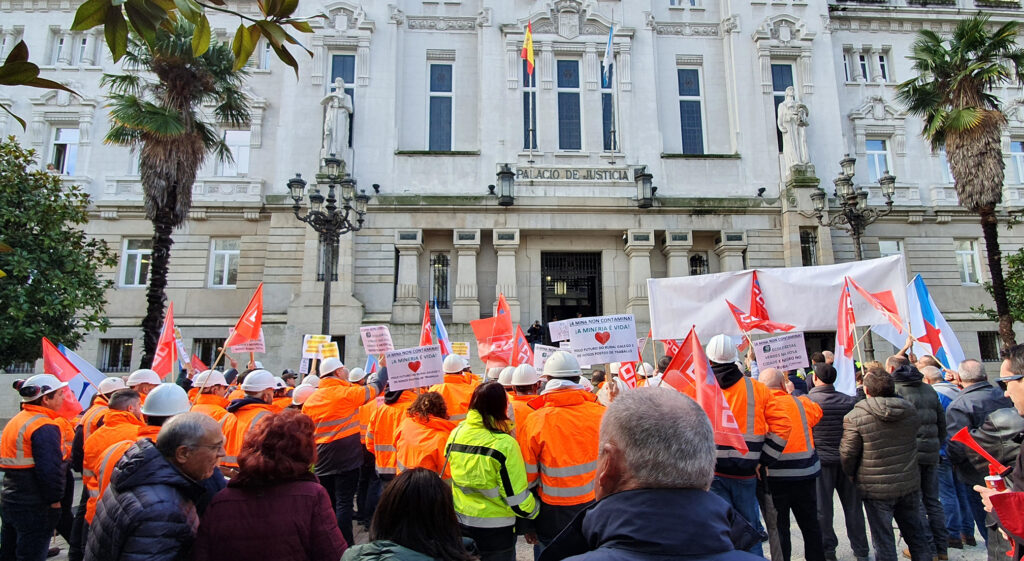- Two hundred people, including workers, town mayors, industry associations and labor unions have mobilized today in A Coruña to ask for the reversal of the decision of precautionary suspension of Section C.
- The closure of the mine would deprive the Ourense mountain region of one of its primary drivers of development, resulting in the loss of over a hundred jobs, in addition to those created indirectly.
- Spain would miss the opportunity to lead in the supply of strategic minerals for the new green and digital economies, as the Penouta Mine is the sole producer of tantalum and niobium in Europe.
A Coruña, November 9, 2023 – While the company directs its efforts towards pursuing every legal avenue to reverse the precautionary suspension of Section C of the mine, today, a gathering of two hundred individuals, comprising workers, town mayors, industry associations, and labor unions, converged at the TSXG to champion the cause of preserving jobs at the Penouta Mine in the Ourense municipality of Viana do Bolo.
Under the slogans “Penouta Non se Pecha” [No to the closure of Penouta] and “Minería es Vida,” [Mining is life] they emphasize the significance of the Penouta Project for both regional and national industrial and economic activity. It serves as a catalyst for rural development upon which 129 families and associated companies directly depend, with the majority located in the Viana do Bolo region. Additionally, it generates indirect employment, estimated at three jobs for each position in the mine. “This decision effectively implies mortgaging the future of the Ourense mountain region three decades ahead, as the Penouta Project has a 30-year lifespan, extendable to 75 years, significantly impacting rural development and addressing the issues of depopulated areas in Spain,” the company emphasizes.
Strategic Minerals firmly maintains that the precautionary suspension of Section C lacks a valid basis. The decision fails to address the potential harm it might cause, while, on the other hand, the actual consequences of the mine’s closure remain unassessed.
Strategic Metals for the Decarbonization of the European Economy
This decision not only has direct repercussions in Viana do Bolo and its region but also extends beyond Galicia, impacting the Spanish and European economies significantly. The closure of the Penouta Mine signifies Spain’s missed opportunity to lead in the supply of essential minerals crucial for the new green and digital economies. This comes at a time when Brussels has just issued a call for assistance in locating the materials required for decarbonizing its economy, demanding a strategic materials plan and allowing a two-year timeframe for their extraction.
As a result, member countries, including Spain, are now obligated to develop their national programs for the exploration of geological resources so that the European Commission can expedite these projects.
Strategic Minerals emphasizes that the Penouta Project would enable meeting the European Commission’s requirements since the extraction in Section C provides continuity for the Penouta mining operation for a minimum of thirty years, extendable to 75 years. It complies with all the necessary legal regulations set by public administrations, making it a strategically and sustainably viable project, both economically, socially, and environmentally. Notably, it’s the sole operating mine in Europe producing tantalum and niobium, essential minerals for the new green and digital economies.
Tantalum, in particular, plays a critical role in technology, defense, aerospace, and healthcare sectors. Niobium is used in the high-grade structural steel industry, reducing steel consumption, minimizing energy usage, and enhancing its composition. It’s also utilized in the automotive, aerospace, and healthcare sectors. Lastly, tin finds applications in the automotive, technology, optoelectronics, energy, food, health, dental, aerospace, wine, welding, and lithium-ion battery industries. These are all high-quality, scarce products of significant economic importance.

